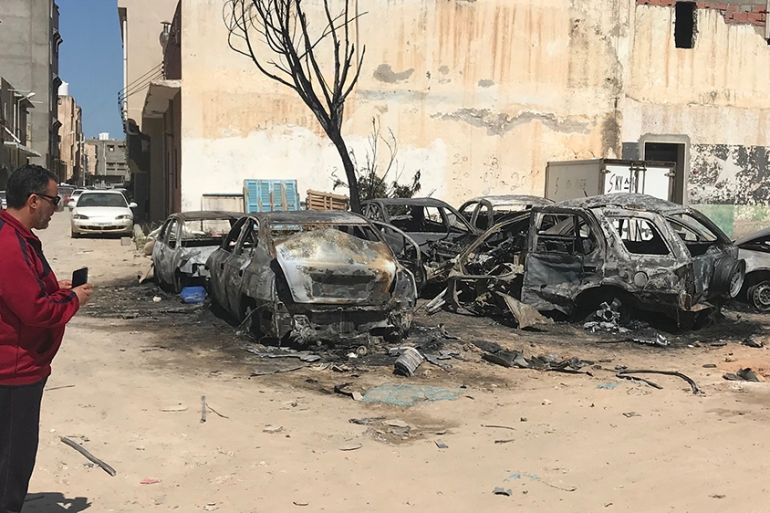Tripoli suburb hit by mortars as the West divided on Libya truce
Foreign powers unable to present a united front at the UN as shelling continues to add to people’s suffering.

A suburb of Tripoli was hit by mortar bombs that narrowly missed a clinic, bringing the death toll to over 200 in the two weeks since renegade Libyan commander Khalifa Haftar‘s troops launched a westwards offensive to take the Libyan capital.
Shelling could also be heard on Thursday from a battle raging in two southern suburbs of Tripoli, according to residents and an official from the self-styled Libyan National Army (LNA) led by Haftar.
Keep reading
list of 4 itemsAbout 282 million people faced acute hunger last year: UN-led report
North Korea conducts test on new ‘super-large warhead’: State media
‘Blatant aggression’: Reactions to US veto of Palestine’s UN membership bid
The shelling came a day after seven people were killed when Grad rockets hit a densely populated district of Tripoli, the ongoing violence deepening the chaos that has plagued the oil-producing nation since Muammar Gaddafi‘s overthrow in 2011.
Residents blamed Haftar’s eastern forces for the shelling, saying the rockets had been fired from the direction of their positions south of the capital.
“We say to the United Nations and the Security Council: Listen. Listen to the bombing… Rockets are coming down on us. For this reason, please find a solution for us,” said Youssef Salem, a displaced man from the southwestern suburb of al-Suani.
The LNA has denied shelling residential areas.
The renewed fighting has also displaced more than 25,000 people, according to the International Organization for Migration.
The Tripoli-based, UN-recognised Government of National Accord (GNA) issued arrest warrants for Haftar – a former CIA asset – and other top eastern officials, blaming them for Wednesday’s shelling.
Eastern officials have already issued arrest warrants for GNA head Fayez al-Sarraj and other western officials as there is no sign of a political solution or even of a ceasefire.
Refugees evacuated
The renewed fighting prompted the UN to evacuate 163 refugees from Libya to neighbouring Niger, but more than 3,000 others were still trapped in detention centres affected by clashes.
The move marked the first evacuation of refugees and migrants out of Libya since fighting escalated in Tripoli two weeks ago, the UN refugee agency said.
“Given the situation in Libya, humanitarian evacuations are a lifeline for detained refugees whose lives are in jeopardy in Libya,” UN refugee chief Filippo Grandi said in a statement.
Meanwhile, France on Thursday rejected the GNA’s “completely unfounded” accusation that it has been supporting Haftar.
“France supports the legitimate government of Prime Minister Fayez al-Sarraj and the mediation of the UN towards an inclusive political solution in Libya,” the French presidency said in a statement.
The interior ministry of the UN-recognised government had, earlier on Thursday, announced the suspension of relations with Paris after accusing France of actively supporting Haftar and his LNA.
Foreign powers
Meanwhile, foreign powers have been worried but unable to present a united front over the latest flare-up.
A British bid at the UN Security Council to demand a ceasefire in Libya faced opposition on Thursday from Russia and the United States, raising doubts about prospects for a draft resolution to halt the bloodshed in Tripoli, diplomats said.
The United Kingdom put forward the measure after forces loyal to Haftar launched their offensive on April 4.
During a closed-door council meeting on Thursday, Russia again insisted that there be no language criticising Haftar in the draft resolution while the US appealed for more time to weigh its options, diplomats said.
“We want to have this resolution,” German Ambassador Christoph Heusgen told reporters after the meeting. “We want to have a strong resolution… with a united council – everybody behind it – that says who is responsible and what needs to be done.”
“Not having this now is … frustrating,” he added.
British Ambassador Karen Pierce said efforts would continue to reach a consensus next week.
UN diplomats, however, raised doubts over whether the council would be able to agree on a text, with the US reluctance to take action throwing a new spanner in the works.
Oil flow
There was speculation that President Donald Trump’s administration may be consulting Egypt – a strong Haftar ally – and other players in the region, or the Libyan leaders themselves, on how to address the crisis.
The council heard a briefing by video link from Tripoli by UN envoy Ghassan Salame, who raised concerns about the escalation in fighting and weapons flows to Libya.
Italy, with considerable oil interests in Libya, supports the Tripoli government of al-Sarraj and was unhappy with French reluctance to back a recent European Union resolution urging Haftar to halt his advance.
The conflict threatens to disrupt oil flows, foment migration across the Mediterranean Sea to Europe, and allow armed groups to exploit the chaos.
Haftar enjoys the backing of Egypt, the United Arab Emirates and Saudi Arabia, who view him as an anchor to restore stability and combat armed groups.
Earlier this year, his forces seized the south and its two oilfields, although tribesmen with flexible loyalties remain strong in the sparsely populated desert region.
On the weekend, the LNA dispatched a unit to the eastern oil ports of Ras Lanuf and Es Sider to prepare for a possible attack there.
|
|